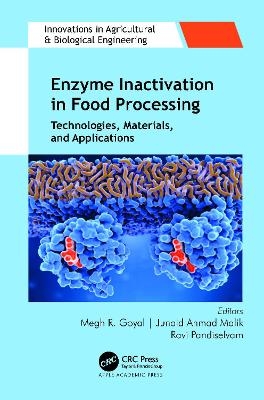
Enzyme Inactivation in Food Processing
Apple Academic Press Inc. (Verlag)
978-1-77491-160-0 (ISBN)
Enzyme inactivation in fruits and vegetables is of utmost importance regarding food quality during storage. This new volume explores important emerging technologies for the inactivation of enzymes in the design and preservation of food. The book covers the basic concepts and chemical methods and then introduces novel processing technologies for inactivating food enzymes. The new technologies are many: pulsed electric field, ultraviolet and light-emitting diodes, ohmic heating, dense-phased carbon dioxide, cold plasma, ultrasonication, microwave processing, radiofrequency, extraction, and others. The volume also looks at the design of nutraceutical-based functional foods, specific foods for gut-microbiodata, the use of omega-3 fatty acids to fortify food products, and the characteristics of dairy-based dry powders, and characteristics of millet starches. It also considers the role of the bioactive compounds and metal ions for catalases secreted by medicinal plants and mushrooms for enzyme inactivation and biosensing, along with the role of bionanomaterials in nanoencapsulation and catalysis.
Megh R. Goyal, PhD, PE, is a prolific author and editor. He is a retired professor from the College of Engineering at the University of Puerto Rico. A former soil conservation inspector, Dr. Goyal was proclaimed as the “Father of Irrigation Engineering in Puerto Rico for the twentieth century” by the ASABE, Puerto Rico Section, for his pioneering work on micro irrigation, evapotranspiration, agroclimatology, and soil and water engineering. Junaid Ahmad Malik, PhD, is a Lecturer with the Department of Zoology at Government Degree College, Bijbehara, Kashmir (J&K), India. He has more than eight years of research experience in ecology, soil macrofauna, wildlife biology, conservation biology, etc. Dr. Malik has published more than 20 research articles and technical papers in international peer-reviewed journals and has authored and edited books, book chapters, and more than 10 popular editorial articles. He has participated in several international conferences, seminars, workshops, and symposia. He is a life member of the Society for Bioinformatics and Biological Sciences. Ravi Pandiselvam, PhD, is a scientist in the Physiology, Biochemistry and Post-Harvest Technology Division at the ICAR-Central Plantation Crops Research Institute, Kasaragod, India, where he contributes to developing value-added food products (viz., Kalpa Krunch and coconutbased frozen delicacies); to the design and development of the tender coconut trimming machine, coconut testa removing machine, and tender coconut cutting machine; and to designing preservation protocols for trimmed tender coconut for commercialized sales. He has authored or co-authored more than 60 journal articles, several books, and 30 book chapters and serves on the editorial boards for many prominent science journals.
PART I: NANOMATERIALS FOR MEDICAL APPLICATIONS 1. Control Measures for Food Enzymes: Basic Concepts and Chemical Methods 2. Novel Food Processing Technologies for Inactivation of Food Enzymes 3. Scope of Ozone Technology for Inactivation of Food Enzymes 4. Potential of Pulsed Electric Field for Inactivation of Food Enzymes 5. Microwave Processing and Ohmic Heating Technology for Inactivation of Food Enzymes 6. Dense Phase Carbon Dioxide and High-Pressure Processing: Effects on Food Enzymes 7. Radiofrequency Technology for Inactivation of Food Enzymes 8. Ultraviolet and Light-Emitting Diode Technologies for Inactivation of Food Enzymes 9. Applications of Ultrasound Technology for Inactivation of Food Enzymes 10. Potential of Enzymes for Biodegradation of Plastic Waste PART II: PLANTS AND BIOPRODUCTS FOR INACTIVATION OF ENZYMES 11. Natural Medicinal Products as Potential Enzyme Inhibitors 12. Enzymatic Inhibitors from Medicinal Plants 13. Mushrooms as Source of Enzyme Inhibitors 14. Enzymatic Browning- Mechanism and Prevention 15. Role of Metal Ions and Organic Compounds on Lignocellulolytic Enzyme Activities 16. Insight into Catalase Immobilization, Applicability and Inactivation Mechanisms Through Process Engineering Strategies PART III: BIONANOMATERIALS FOR INACTIVATION OF ENZYMES 17. Nanozymes-based Biosensors for Sustainable Food Engineering: Recent Research and Future Prospects 18. Nanoencapsulated Antimicrobial Carriers in Packed Food 19. Advanced Bionanomaterials for Catalysis and Surface Process
| Erscheinungsdatum | 08.08.2023 |
|---|---|
| Reihe/Serie | Innovations in Agricultural & Biological Engineering |
| Zusatzinfo | 31 Tables, black and white; 15 Line drawings, color; 33 Line drawings, black and white; 3 Halftones, black and white; 15 Illustrations, color; 36 Illustrations, black and white |
| Verlagsort | Oakville |
| Sprache | englisch |
| Maße | 156 x 234 mm |
| Gewicht | 1210 g |
| Themenwelt | Schulbuch / Wörterbuch |
| Naturwissenschaften ► Biologie | |
| Technik ► Lebensmitteltechnologie | |
| ISBN-10 | 1-77491-160-4 / 1774911604 |
| ISBN-13 | 978-1-77491-160-0 / 9781774911600 |
| Zustand | Neuware |
| Haben Sie eine Frage zum Produkt? |
aus dem Bereich


